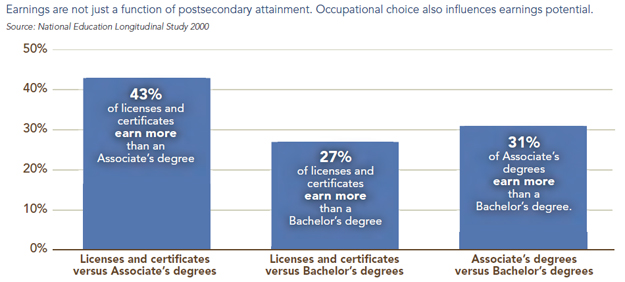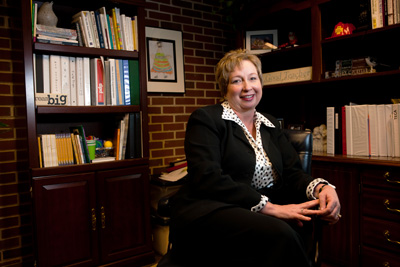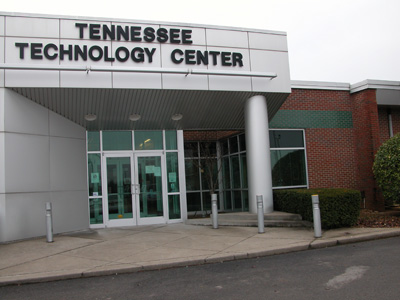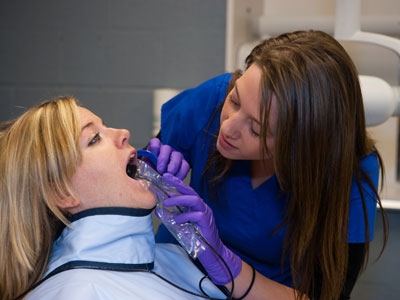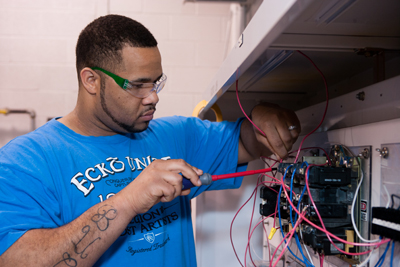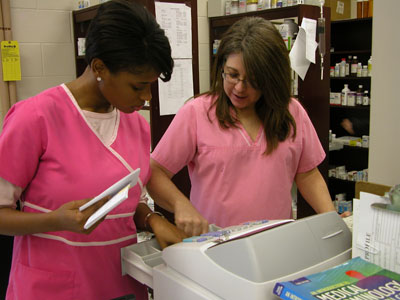There's more to higher education than bachelor's degrees and associate's degrees. A student can choose to get a postsecondary certificate or license, offered through a community college or a trade school. The skills students learn in certificate programs will be increasingly in demand as the economy grows and becomes more complex according to economist Tony Carnevale, director of the Georgetown University Center on Education and the Workforce.
Certificate programs "tend to be very efficient," he says. "There's very little general education associated with them. You don't take history, you don't take foreign language. You take whatever it is you need to know to do the work in your occupation."
People can get certificates in a wide range of fields, from traditional occupations such as welding and machine tools to newer fields such as computer information systems and surgical technology. Certificates — not college degrees - are required for some of the highest demand occupations, particularly in health care.
For some people, getting a certificate can be more valuable than getting an associate's degree. A longitudinal study of workers who are now in their mid 30s found that about 40 percent of those with certificates or licenses were earning more money than their peers with just an associate's degree; more than a quarter of those with certificates or licenses were making more than those with bachelor's degrees.
The Tennessee Technology Centers
Most students who get certificates go to community colleges or for-profit trade schools, but in Tennessee students have the option of a non-profit system of public technical schools called the Tennessee Technology Centers.
The Centers began as part of the state's secondary school system in the 1960s. Most states had robust vocational education programs in their high schools back then. Beginning in the early 1980s, many states moved vocational education to their community colleges as skill requirements for jobs began to ratchet up rapidly. But for a number of unique political reasons, Tennessee kept its system separate from community colleges, and now the state has one of the most successful postsecondary certificate programs in the country.
The Tennessee Technology Centers offer an educational model that contrasts sharply with the way conventional college education is organized. The focus is hands-on learning and applied skills. School is every day from 7:45 to 2:30; a consistent, daily schedule helps students arrange work and childcare. All of the programs are designed to be quick.
"We have several programs that can provide you with a career in a year," says Carol Puryear, director of the Tennessee Technology Center in Murfreesboro, south of Nashville.
When students sign up, the only thing they need to decide is what program they want to pursue. There's no phonebook-sized course catalog, only pamphlets that outline the details of each program.
"We do not act like Burger King here," says Puryear; students do not get to "have it their way."
They decide what occupation they want, and the school tells them exactly what they need to do to complete a certificate to work in that occupation.
Happy to Have Another Option
For student Savannah Smith, it's a relief to have the programs laid out so clearly like this. Smith is learning to be a dental assistant. She originally went to college to become a pharmacist but she found all of the choices she had to make about classes overwhelming. And she didn't like having to take general education courses, like English and history.
"I was so burnt out on wanting to be a pharmacist 'cause I had to go through all this stuff I didn't care for," Smith says.
Something else that's different at the Tennessee Technology Centers is the approach to remedial education. At most traditional colleges, when students are not prepared for college-level work, they get put in remedial classes. Typically students must complete remedial classes before they can take courses for their major. Many get frustrated and quit.
At the Tennessee Technology Centers there are no remedial classes, yet all students get tutoring in math and reading skills and have to demonstrate they've mastered the knowledge needed for their particular occupation. Students go to a computer lab once a week and work their way through a program, with an instructor to help when they need it. Students work at their own pace — not only when it comes to math and reading skills, but in other courses too.
"Everyone's on an individualized training program," says Puryear. "So if you come in and you excel in brakes in automotive, you will move through that section faster. And then when you get to the electronics, you may have to slow down a little bit."
Puryear thinks this individualized approach to learning is one reason so many students are successful at the Tennessee Technology Centers. About 70 percent of the students graduate, and most of them complete certificates within 18 months. The comparable graduation rate at Tennessee's community colleges is 11 percent.
The job placement rate is high, too. More than three-quarters of Tennessee Technology Center graduates get jobs in their field.
One of the most appealing things about the Tech Centers for students is that for most of them, it's free. Federal grants and a state financial aid program completely cover tuition and fees for most students. Even with no aid, a Tech Center education is a bargain; the total cost for most programs is less than $5,000, a fraction of what it would cost to get a bachelor's degree from a state university.
Costs are low because there's no campus center, no sports program, no research labs — it's just the basics. That's all most students who come to the Tech Centers can afford. Nearly 70 percent of them come from households with incomes of less than $24,000, and nearly half report annual incomes of less than $12,000.
For student Chermil Balbalose, being able to get a certificate without taking out student loans makes a huge difference.
"That is a great feeling," she says.
Balbalose is studying to be a pharmacy technician; she too tried college first, but dropped out with no degree and about $7,000 in student debt.
Realistic Pathways
Economist Tony Carnevale says getting a certificate is a good option for many people. The problem is that a lot of low-income students — and African-American and Hispanic students - are systematically ending up in trade school, while students from higher income and white families are much more likely to get traditional college degrees.
"We have built a system that sorts people by race, class and ethnicity very aggressively," says Carnevale.
The problem with this sorting is that while certificates can boost people's incomes, someone with a college degree is likely to make significantly more money over a lifetime than someone with just a certificate.
Carnevale says getting more low-income students through college will not be easy, especially as tuitions continue to rise and governments cuts back on aid programs. In the meantime, anyone trying to counsel young people on their options after high school faces what he considers the "exquisite American dilemma."
On the one hand, everyone should be encouraged to get a college degree because that's the most certain path to the middle class. On the other hand, if a student is not likely to make it through college, for financial or other reasons, they are probably better off with something like a Tennessee Technology Center.
"We have to give people realistic pathways," says Carnevale.
Right now, too many students are going to college and getting no degree out of it. Carnevale says many of those people would probably be much better off with a postsecondary certificate.



